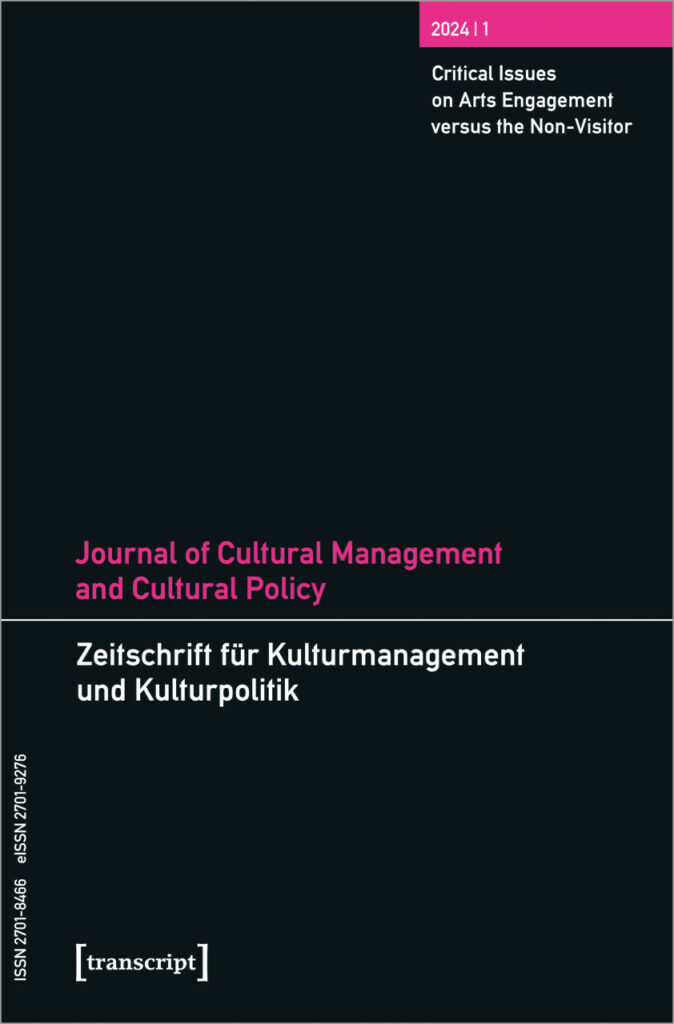Research Article
The untapped potential of keyworker and recommendation strategies using the example of a program evaluation in the theater
Abstract
Personal recommendations and word-of-mouth communication are central to information gathering and the decision-making process for visiting a cultural institution. More and more publicly funded theaters want to use this resource of their existing audience more effectively in order to attract and retain (non-)visitors, break down access barriers and strengthen their legitimacy. They are therefore implementing multiplier and intermediary projects at their theaters that are based on the keyworker strategy. The case study uses the evaluation method of the CIPP model to show the framework conditions, strategic approaches, implementation practices, and effects at four theaters that implemented such multiplier projects during the 2020/21 season. It shows that the implementation of the projects only partially accomplished the objectives. The theaters have either not internalized audience development and comprehensive visitor orientation as a fundamental organizational philosophy or this has not yet manifested itself in the existing work processes and organizational structures.
Keywords
2024 (1)
Critical Issues on Arts Engagement versus the Non-Visitor

Related Articles
Imposed leadership in UK funded theatre and the implications for risk and innovation
Journal of Cultural Management 2019 (1)
Research Article
Journal of Cultural Management 2017 (1)
Case Study
Questions of Power: Discipline and the Greedy Theatre
Journal of Cultural Management 2019 (2)
Essay
Journal of Cultural Management 2017 (1)
Case Study
Yearbook for Culture Management 2012
Research Article
Yearbook for Culture Management 2012
Research Article
© 2026, Journal of Cultural Management and Cultural Policy
Keywords
- Aesthetics
- Higher Education
- Cultural Diplomacy and Foreign Cultural Policy
- Occupation
- Career and Professional Role
- Audience Development
- Audience Studies and Visitor Studies
- Visitor Motivations
- Business
- Covid Pandemic
- Democracy
- Digitalization
- Diversity
- Third Sector
- Empirical Aesthetics
- Development
- Ethics
- Evaluation
- Field Theory
- Festival
- Film
- Federalism
- Community Arts
- Societal Change
- Ideology
- Staging
- Career
- Communication
- Concert
- Creative Industries
- Creativity
- Crisis
- Culture
- arts organizations, cultural organizations
- Cultural Participation
- Cultural Change
- Fincancing The Arts
- Cultural Promotion Law
- Cultural History
- Cultural Management
- Cultural Economy
- Cultural Organizations
- Art Education
- Cultural Policy
- Cultural Production
- Cultural Sociology
- Art Education
- Cultural Understanding
- Arts Administration
- Cultural Industry
- Cultural Sciences
- Art
- Art Field
- Arts Research
- Artists
- Artistic Research
- Artistic Reputation
- Arts Management
- Arts Organizations
- Art education
- Arts Marketing
- Arts Administration
- Curating
- Leadership
- Literature
- Advocacy
- Management
- Marketing
- Market
- Media
- Methods Development
- Mexico
- Monumentalizing
- Museum
- Music
- Non-Visitor Studies
- Opera
- Orchestra
- Organization
- Political Expression
- Post-truth Politics
- Professional Role
- Audience
- Audience Development
- Law
- Government
- Role
- Socially Engaged Art
- Social Cohesion
- Social Change
- Social Cohesion
- Non-visitor Socio-demographics
- Socioculture
- State
- Symbolic capital
- Dance
- Participatory Justice
- Theatre
- Theatre Governance
- Theory Development
- Tourism
- Transformation
- Survey
- Entrepreneurship
- Urbanism
- Civil Society


